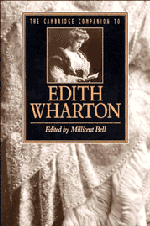Book contents
- Frontmatter
- Introduction
- 1 The Social Subject in The Age of Innocence
- 2 Edith Wharton and the Science of Manners
- 3 Edith Wharton and Race
- 4 The Custom of the Country
- 5 The Female Conscience in Wharton's Shorter Fiction
- 6 Law, Language, and Ritual in Summer
- 7 The House of Mirth
- 8 The Fruit of the Tree
- 9 The Valley of Decision
- 10 Edith Wharton's Valley of Decision
- Bibliography
- Index
- Series List
Introduction
A Critical History
Published online by Cambridge University Press: 28 May 2006
- Frontmatter
- Introduction
- 1 The Social Subject in The Age of Innocence
- 2 Edith Wharton and the Science of Manners
- 3 Edith Wharton and Race
- 4 The Custom of the Country
- 5 The Female Conscience in Wharton's Shorter Fiction
- 6 Law, Language, and Ritual in Summer
- 7 The House of Mirth
- 8 The Fruit of the Tree
- 9 The Valley of Decision
- 10 Edith Wharton's Valley of Decision
- Bibliography
- Index
- Series List
Summary
Edith Wharton, who was never obscure or forgotten, has been rediscovered a number of times. In 1938, the year after she died, Edmund Wilson published a famous essay, “Justice to Edith Wharton,” because he felt that the notices at her death had underestimated her achievement. Between The House of Mirth (1905) and The Age of Innocence (1920) she had attained, he thought, an intensity - the consequence of secret personal anguish - which made her “important during a period . . . when there were few American writers worth reading.” He deplored the lowering of her reputation by the effect of her later, inferior works, written when some of this anguish had passed. Unquestionably, Wharton's powers had waxed and waned, as Wilson said. But the life curve of her reputation, whether measured by critical blame or esteem or by popular success or failure had not been governed by the issue of literary achievement alone; it was her subject matter and presumed personal attitudes that chiefly provoked response.
- Type
- Chapter
- Information
- The Cambridge Companion to Edith Wharton , pp. 1 - 19Publisher: Cambridge University PressPrint publication year: 1995
- 15
- Cited by

